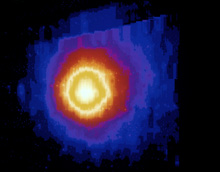---------------------------------------------------------------
http://www.theguardians.com/space/commons.htm
What is Peaceful use of Outer Space?
"Peaceful Use of outer Space" leads the way for the people of the
world to see how peaceful co-existence can be achieved.
Outer Space has also become a focus as one of the United Nation's five
global commons, which belong equally to all mankind.
snip
---------------------------------------------------------------
http://www.theguardians.com/space/orbitalmech/gm_ssint.htm
Help us to design the Space Station of the future!
Here is our idea of a Space Station for the year 2020. We'd like you
to explore it and to see if you can design your own Space Station.
* Would you like to design and build a model of the station?
* Would you like to have your work shown on our website?
* Would you like to see other people's ideas?
snip
---------------------------------------------------------------
http://www.theguardians.com/Microbiology/gm_mbt02.htm
FactPak Index
Microbiology on Space Station 2020
A day on Space Station 2020 with Henna Rashid - An interactive visit
to Space Station 2020.
Introduction to Microbiology on the Space Station 2020 - What account
has to be taken of microbes on a space station, from design to
operation.
Food Preparation - On Space Station 2020.
Waste Management - How to process sewage and garbage in space.
Control of Infection - How to look after the health of the crew on a
space station.
Metal Munchers - Microbes that attack inorganic structures and systems.
Biomedical Research - What microbiological research will be conducted in space?
Deep Space Missions - What are the medical and other biological needs
of manned missions to the planets.
Protecting Earth... - Is Earth in danger of contamination by alien
microbes and how can we protect other planets from Earth biology.
snip
---------------------------------------------------------------
The above web site was found while looking for examples of how we will
handle supporting life while off planet.
It dates to 1999 so some links may not work but thought that it was a
nice example of some of things one will have take care of while away
from Mother Earth.
Thanks for looking up with me.
Larry Kellogg
Web Site: http://lkellogg.vttoth.com/LarryRussellKellogg/
BlogSpot: http://kelloggserialreports.blogspot.com/
RSS link: http://kelloggserialreports.blogspot.com/atom.xml
Newsletter: https://news.altair.com/mailman/listinfo/lunar-update
Trying to figure out where the time goes. --- http://twitter.com/CdrLuna
==============================================================
http://www.space.com/scienceastronomy/solarsystem/mars_waste_010814-1.html
Waste Not, Want Not: Recycling the Martian Way
What comes out of the human body and goes into a toilet is often
thought of as an end product. But for future residents of Mars, human
waste will need to take on a more vital role.
Like becoming fertilizer for growing food.
Because it costs thousands of dollars to lift every pound of stuff
into space, and even more to get it to Mars, mission planners don't
want to waste a thing. Human excrement, being rich in nutrients, can
be a composter's dream. So a group of European researchers is taking
on the task of figuring out just how to safely manage a high-tech
Martian outhouse.
Because somebody, of course, has to do it.
snip
==============================================================
http://space.about.com/od/livinginspace/a/waterrecycling.htm
NASA Advances Water Recycling for Space Travel and Earth Use
Water Processor Assembly Developed by the Marshall Center
By Nick Greene, About.com
Water is one of the most crucial provisions astronauts need to live
and work in space, whether orbiting Earth, working at a lunar base or
traveling to Mars. The Water Processor Assembly developed by the
Marshall Center will improve water recycling on the International
Space Station.
Would Columbus have reached the New World if his ships could not carry
enough water for their crews? Would Lewis and Clark have made it to
the Pacific if they had no fresh water along the way?
The answer is probably no, because water is just as precious to
explorers as it is to everyone on Earth. Water is one of the most
crucial provisions astronauts need to live and work in space, whether
orbiting Earth, working at a lunar base or traveling to Mars. That's
why NASA is following several different but complementary avenues at
four agency centers to develop dependable ways of recycling water.
"Developing innovative life support technologies will reduce risks
associated with human space exploration," said Eugene Trinh, director
of the Human System Research and Technology Program, NASA
Headquarters, Washington. "We are working to improve technology used
onboard the International Space Station (ISS) and have several
research projects under way for future missions to the moon and Mars."
snip
==============================================================
And John Reed suggests seeing how Issac Asimov told it in "The Martian Way".
http://en.wikipedia.org/wiki/The_Martian_Way
"The Martian Way" is a science fiction novella by Isaac Asimov. It was
first published in the November 1952 issue of Galaxy Science Fiction
and reprinted in the collections The Martian Way and Other Stories
(1955) and The Best of Isaac Asimov (1973). It was also included in
The Science Fiction Hall of Fame, Volume Two (1973) after being voted
one of the best novellas up to 1965.
Mario Esteban Rioz and Ted Long are both Scavengers, Mars-born humans
who scour space for the spent lower stages of spacecraft. Rioz has
been doing the work his whole life, but his partner for his current
six-month trip puzzles him—a former mining engineer who gave up a
comfortable, well-paying desk job in the Martian iron mines for the
hardscrabble life of a Scavenger. He doesn't understand Long's
philosophical musings on what he calls "the Martian way".
Rioz is tense because the trip has been unprofitable. He chews Long
out for wasting power listening to some Grounder (Earth-born)
politician named John Hilder making a speech. As Rioz listens to the
speech, he realizes that Hilder is saying that Earth's settlements on
Mars, Venus, and the Moon are useless drains on Earth's economy, and
that spaceships are wasting irreplaceable water by using it as
reaction mass.
A year later, Hilder has used his campaign against "Wasters" to gain
power in Earth's Assembly, and has just reduced shipments of water to
Mars, putting the Scavengers out of work. Rioz thinks the Martians
should raid Earth's oceans for water, but Long disagrees. He has a
plan of his own to deal with the water crisis. When Hamish Sankov, the
head of the Martian colony, learns of Hilder's plan to cut off all
water shipments to Mars, he authorizes Long's plan: to travel to
Saturn and tow a fragment of the rings—which is almost pure water—back
to Mars.
snip
http://homepage.mac.com/jhjenkins/Asimov/Stories/Story166.html
Review of "The Martian Way"
==============================================================
WHAT THE MIND CAN CONCEIVE, AND BELIEVE, IT WILL ACHIEVE - LRK
==============================================================
Many folks would like to see us back on the Moon and developing its resources.
Saturday, May 17, 2008
Subscribe to:
Post Comments (Atom)





No comments:
Post a Comment
Note: Only a member of this blog may post a comment.